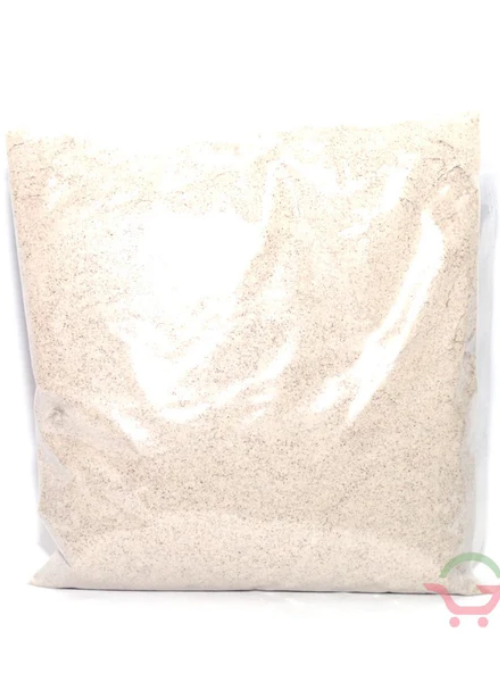
- Description
- Review
Description
Ragi flour is one of the Indian staples which is high in fibre content and low in cholesterol. It is prepared by either crushing of spouting the dried ragi grain and then grinding them. As the grain is too tiny to be polished or processed, it is most of the time consumed in its purest form. Also called raagi
Ragi flour is an excellent carbohydrate substitute and due to its high dietary fibre content, its great for those looking to shed some pounds. It is also a rich source of calcium, iron, antioxidants, vitamins, and minerals. Hence, it promotes bone health, helps in weight loss, controls diabetes, lowers blood cholesterol and controls blood sugar. Ragi flour is also anti-diabetic, anti-microbial and anti-ulcerative properties.
It is a perfect healthy flour for making porridge, bhakris, cookies and laddoos. In Karnataka, which is the leading producer of finger millet, it is generally consumed in the form of Ragi-Mudde (balls), prepared by cooking the Ragi Flour with water to achieve a dough-like consistency. The steamed dish is best served with spicy meat gravies. Another dish, Ragi Kanji (porridge) is a commonly found as a healthy dish in the state of Tamil Nadu. Have a look at this blog article for some recipe ideas.
Ragi is the talk of the town these days. It is, in fact, among the superfoods that are gaining momentum around the globe. But, what makes this super Millet so special?
Let’s unravel the nutritional profile of the humble Ragi flour.
What is Ragi flour?
Ragi flour is a highly nutritious powder obtained from crushing the Ragi grains. Ragi grains resemble mustard seeds but are deep red (not black) in color. Therefore, Ragi flour has a reddish tinge to it. Today, one can also buy organic Ragi flour.
Ragi is called Finger millet in English and Gierstbloem in Dutch. The healthy cereal goes by different names in different states; Ragulu in Telugu, Nachani in Marathi, Bhav in Gujarati, and Madua in Bengali.
Ragi is a wholesome food and suitable for all age groups. This superfood has long been used as a traditional baby food, but adults have also become aware of its umpteen benefits.
It is, therefore, a hot favorite among health buffs. Because of its tremendous health benefits, you can add Ragi flour or Ragi grains to a meal daily.
How to use Ragi flour?
One can use the Ragi flour in a variety of ways.
One can sprout ragi at home through an easy process or buy the readily available Ragi flour. The millet is fairly versatile and can be used in numerous recipes, like roti, naan, bread, pancakes, porridge, upma, idlis, dosas, and even cookies.
Ragi is also available in the roasted form; its nutty flavor makes for a yummy snack.
Health benefits of Ragi
- Protein- Ragi is an excellent source of protein. The essential amino acids, such as methionine, found in Ragi are crucial for health and are not commonly found in other grains.
- Fiber- Ragi is a good source of fiber. Consuming Ragi regularly in your diet improves gut health and also aids in weight loss as it keeps you feeling full for longer periods.
- Calcium- The calcium content in Ragi is more than double than in other sources of food.
- Helps control diabetes- The phytochemicals found in the outer coat of Ragi are excellent for regulating blood sugar levels.
- Gluten free- For people suffering from gluten allergy, Ragi is a good substitute as it is gluten-free.
Additionally, Ragi is also believed to have anti-cancer, anti-aging and anti-microbial properties.
How to sprout Ragi?
- Wash the Ragi grains in clean water.
- Soak grains for 8-10 hours.
- Drain out excess water using a wide strainer. Cover the strainer with a porous thin cloth (Muslin). Leave these grains to rest in the strainer for 12-15 hours.
- Within 12-15 hours, the sprouts will start appearing.
- You can season the sprouted Ragi with sauces, black salt, black pepper, and chopped veggies of your choice to relish a super-healthy Ragi salad.
Also called finger millet flour, ragi atta, Nachni.
Ragi is naturally Gluten Free.
Looking where to buy Ragi Flour online in Canada? We offer home delivery everywhere in Canada. We also have Organic Ragi Flour.
Farine de Ragi
La farine de ragi est l’un des aliments de l'Inde à haute teneur en fibres et pauvre en cholestérol. La farine de ragi est préparée en écrasant le grain de ragi séché et en le broyant. Comme le grain est trop petit pour être poli ou traité, il est la plupart du temps consommé dans sa forme la plus pure.
C'est un excellent substitut de glucides et, en raison de sa teneur élevée en fibres alimentaires, il est idéal pour ceux qui cherchent à perdre du poids. C'est aussi une riche source de calcium, de fer, d'antioxydants, de vitamines et de minéraux. Par conséquent, il favorise la santé des os, contribue à la perte de poids, contrôle le diabète, diminue le cholestérol sanguin et contrôle la glycémie. La farine de ragi possède également des propriétés antidiabétiques, antimicrobiennes et anti-ulcéreuses.
C'est une farine parfaite pour la fabrication de porridge, bhakris, biscuits et laddoos. Dans l'état de Karnataka, principal producteur de millet, la farine de ragi est généralement consommée sous forme de Ragi-Mudde (boulettes), préparées en cuisant la farine Ragi avec de l'eau pour obtenir une consistance pâteuse. Le plat cuit à la vapeur est mieux servi avec des jus de viande épicés. Un autre plat, le ragi kanji (bouillie), est un plat sain dans l’état du Tamil Nadu. Consultez cet article de blog pour quelques idées de recettes.
Sans gluten.
